EntrepreNURSEship
January 10, 2024 Meredith Lidard Kleeman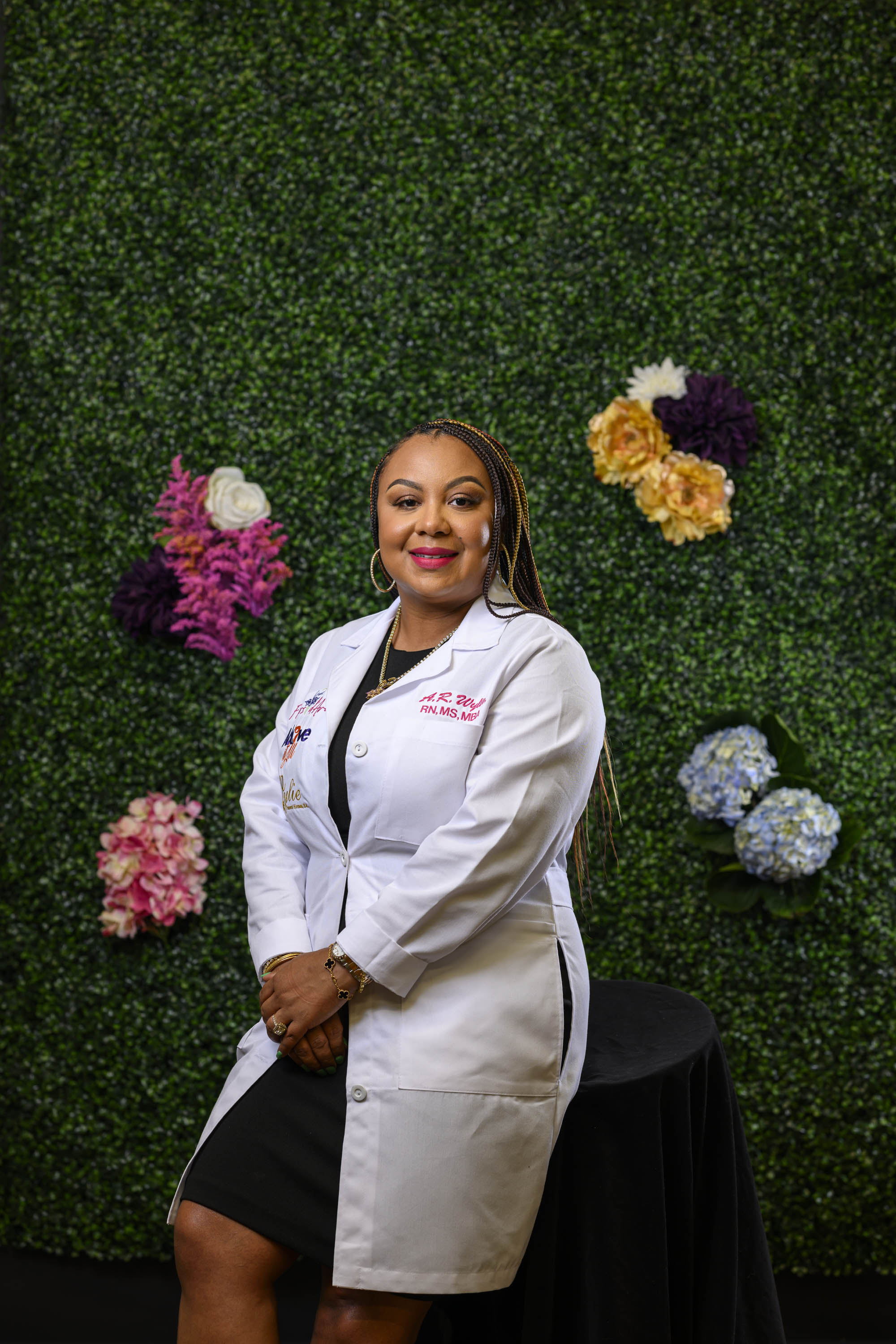
Many UMSON graduates have followed their passion to become entrepreneurs and owners of businesses that offer health care services focused on improving health outcomes within their communities.
Photo: Ashley Rock Wiley, MSN '10, BSN '05, RN, owns a floral boutique.
Big problems require big, innovative solutions. As providers who focus on interprofessional collaboration and multitaskers who engage and connect with people, nurses are uniquely positioned to develop innovative approaches to big issues affecting patients. In fact, many UMSON graduates have followed their passion to become entrepreneurs and owners of businesses that offer health care services focused on improving health outcomes within their communities.
“Entrepreneurship is described as an innovation mindset and skill set,” says Lori Edwards, DrPH, BSN ’80, RN, CNS-PCH, BC, assistant professor and associate dean for the Master of Science in Nursing program, who is researching nurse entrepreneurship.
Nurses become entrepreneurs and business owners, but they often learn that skillset independently; it’s not a competency formally taught in nursing programs, according to Edwards. “My colleagues and I believe it would be very helpful if nurses are introduced to this concept in beginning and graduate education,” Edwards says.
It’s a concept that’s already trending among nursing organizations. The National Academy of Medicine’s The Future of Nursing 2020-2030 report states that innovating and improving is an essential competency for nurse leadership. To advance health equity, the report calls for nurses to take on leadership roles that “improve health care by providing quality care to people, encouraging workplace innovation and improvements, implementing programs, and using evidence-based approaches that improve quality of care and address structural barriers.”
We’re sharing four stories of successful entrepreNURSES who have become innovative business owners serving patients within and beyond their communities.
ASHLEY ROCK WYLIE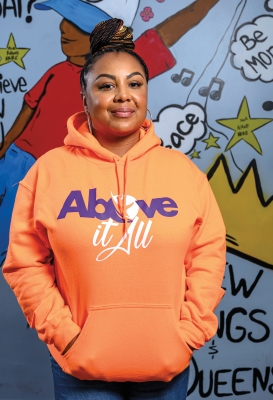
MS ’10, BSN ’05, RN
Wylie’s path to entrepreneurship began early in her nursing career when she launched a consulting firm for nonprofits serving underresourced communities. The consulting firm, Dreams 2 Reality, was Wylie’s passion project while she worked as the program director of clinical services at the JACQUES Initiative, focused on supporting patients and communities affected by HIV and Hepatitis C virus, in the University of Maryland School of Medicine’s Institute of Human Virology. However, her entrepreneurial spirit led her to team up with her husband, Brandon Wylie, and other partners in 2014 to create Above it All, which offers outpatient mental health services
to kids, adults, and families in West Baltimore. Inspired by conversations between Brandon and his father, who together operate Wylie Funeral Homes, the family wanted to be involved in the community before a tragedy strikes. The profits from Above It All fund free outreach programs for West Baltimore residents, including nonviolent crisis prevention trainings, meditation yoga, and mindfulness classes.
Wylie managed most of the administrative duties of the business while still working for the JACQUES Initiative and as the nurse manager of infectious diseases at the University of Maryland Medical Center Midtown Campus. She eventually became the director of regional care coordination for CareFirst BlueCross BlueShield, and it was there that Wylie realized she was no longer satisfied with working to achieve the goals of others. “I remember sitting in a CareFirst meeting hearing about what they wanted for the company and how we were going to work for what they wanted and what their future was going to be,” Wylie says. “I realized I don’t want to do this for them, I’d rather do this for myself.”
After getting laid off from CareFirst BlueCross BlueShield in early 2019 due to restructuring, Wylie dedicated herself full time to Above It All, Dreams 2 Reality, and a new venture that her family had established, Fleurs d’Ave Floral Boutique, also located in West Baltimore. When
the previous florist in that location went up for an estate auction in 2018, Wylie’s husband and father-in-law placed the winning bid, ensuring that a successful, Black-owned business remained in the community.
In her role as owner and chief operating officer of Fleurs d’Ave, Wiley has overseen renovations at the original boutique and the opening of a second location and flower stall at Lexington Market in Baltimore. She manages daily business operations and oversees a staff of 10 full-time employees while also working directly with customers to plan floral arrangements for special occasions such as weddings, parties, and homegoing celebrations.
Wylie utilizes skills from her nursing background in all three of her businesses, such as multitasking, assessing a situation, and approaching things from the patient (or customer) perspective. “Nurses can do so many different things,” she says. “Every day is different in health care, and that’s how my world is here, so it doesn’t stress me out as much.”
CAMERON CAMPBELL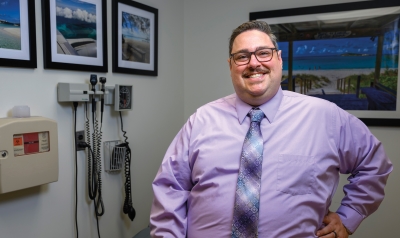
MS ’14, NP
After working as a nurse practitioner in a physician-owned practice for seven years, Campbell was ready for a change. “I knew how I wanted to practice, by spending more time with fewer patients, and the only real way to do that was to own my own practice,” Campbell says.
He and his wife, Krista Zerby, LGMT, a behavioral health therapist, were disenchanted with traditional health care models. Zerby wasn’t happy with how clinical practices treated her as an employee, while Campbell was struggling to find therapists and psychiatric providers to whom he could refer his primary care patients.
“We came up with the idea to do mental health and primary care together, which has a very synergistic effect,” Campbell says. “When you’re not feeling good mentally, you’re not going to feel good physically, and vice versa. Launching our own practice came out of necessity and out of wanting to provide quality, holistic care to patients.”
Campbell and Zerby launched Precision Mental Health in May 2020, focusing on providing telehealth therapy at a time when patients and providers couldn’t safely meet in person due to COVID-19. Campbell purchased his employer’s clinic and launched Precision Health Care in Baltimore in 2021. “I loved my old boss, but it’s more fun going to work knowing I’m in control of the environment,” he says.
While providing quality patient care was the driving force behind launching both health care businesses, offering a fulfilling work environment was also crucial. “We came up with the concept of a therapist-centric practice,” Campbell says. “The first goal is to help patients, but goal 1A is to make sure therapists are taken care of.”
All Precision employees receive health insurance and paid time off in addition to education reimbursement, employee bonuses, and more. “Two of my medical assistants had never had a paid vacation!” Campbell says. Providing these employee benefits affects profit margins and adds to the difficulty of operating a business, but Campbell believes the benefits outweigh the costs. “People are happy, and I would rather make less money and have happy employees than try to pinch pennies,” he says.
MARLA OROS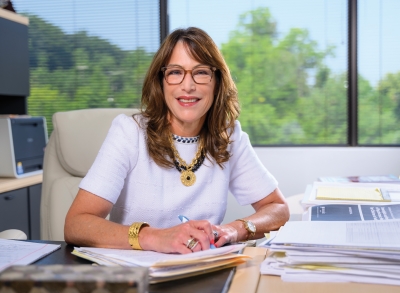
MS, BSN ’84, RN, FAAN
Oros opened her health care management consulting firm, the Mosaic Group in Towson, Maryland, in 2004 after a 20-year career working in public health through roles in hospital administration and program
development, including nine years as the associate dean for clinical affairs at UMSON.
Oros is still focused on health equity and community and public health issues, the areas in which she specialized in previous positions, but now she gets to operate independently. As owner and chief executive officer of the Mosaic Group, Oros has managed rapid growth while doggedly seeking out new clients, an ongoing concern for entrepreneurs. “That’s one of the challenges of owning a company — you’re always cultivating to assure you have business lined up,” she says.
The firm’s largest portfolio is behavioral health integration, which helps a variety of organizations including hospital emergency departments, schools, detention centers, and women’s health practices, to implement prevention and intervention strategies for patients who screen positive for mental health and substance use issues. The Mosaic Group creates programs for clients that include validated screening tools, protocols, and electronic health record modifications, while also directly educating and hiring new staff such as peer recovery coaches and mental health professionals. One of the firm’s growing initiatives is its Reverse the Cycle substance use response program, which introduces medication-assisted treatment and interventions led by peer recovery coaches to emergency departments. The program has been implemented in 76 hospitals nationwide in cities and states with the highest rate of overdose deaths.
Nurses have so much to offer the health care industry but may lack the skillsets associated with running a business, Oros says. The profession affords new nurses many avenues and opportunities to gain the skills needed to open a business and be successful. “I couldn’t do this work without being a nurse — the insight I bring, especially as a community health nurse, is unparalleled,” Oros says. “The ability to really understand the clinical aspects of the work, to truly meet and respond to community needs, and to engage with health care providers and work as part of multidisciplinary team is what nursing is all about.”
AIRELLE RUCKER-SMITH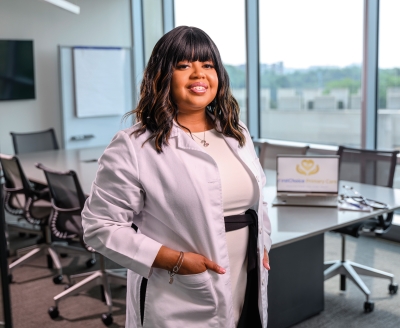
DNP ’19, CRNP
“It’s actually been a goal since I was a little girl to own a health care clinic,” Rucker-Smith says. “My parents have pictures of me in nurse and doctor costumes.” She comes from a family of nurses, and the art of caring was a cornerstone of her upbringing.
“I’ve always had a desire to help others. Owning my own practice allowed me to do things on a greater scale — I felt like I would be able to help more people,” she says.
Rucker-Smith opened FirstChoice Primary Care in Gaithersburg, Maryland, in summer 2022 after dedicating years to acquiring business skills through workshops and courses for aspiring entrepreneurs. She brought on board Monica Patel-Gandhi, DNP ’19, PNP, a former classmate and skilled professional specializing in pediatrics, to extend care and support for families.
“My goal is to have an all-inclusive practice so people don’t have to go to multiple providers,” Rucker-Smith says.
Like many entrepreneurs, Rucker-Smith wears multiple hats, including managing administrative duties, scheduling patients, and billing insurance. She’s eagerly anticipating the recruitment of an additional provider in the near future. “Running a practice is one of the hardest things I’ve done,” Rucker-Smith says. “It gives me a lot of freedom, but it takes a lot of time.”